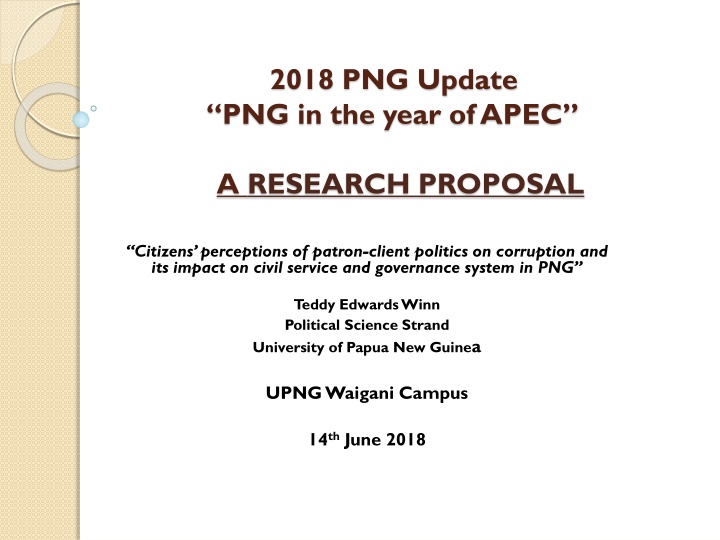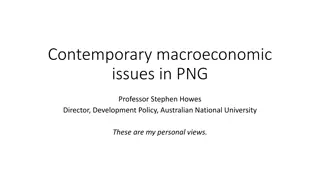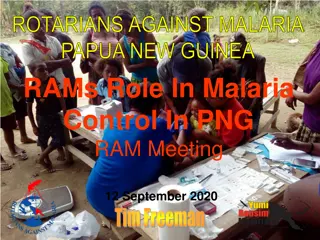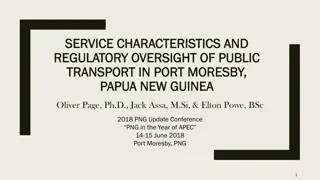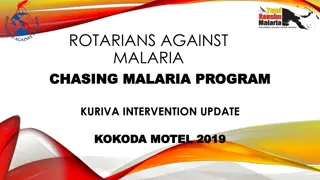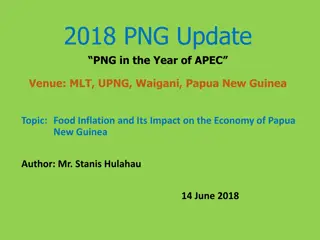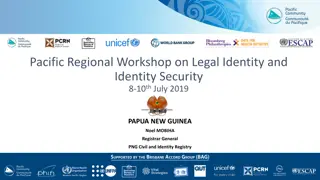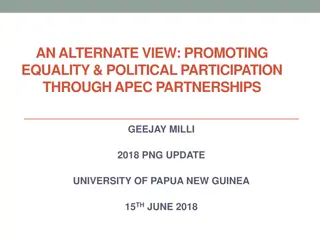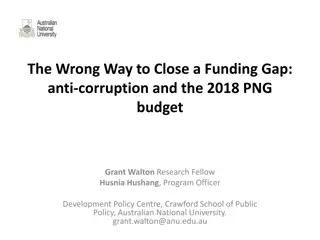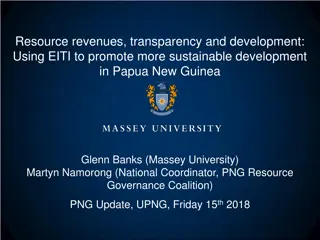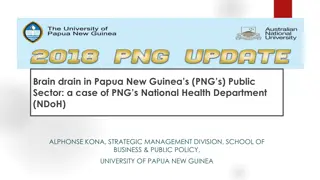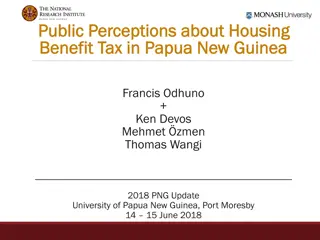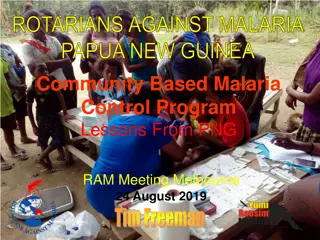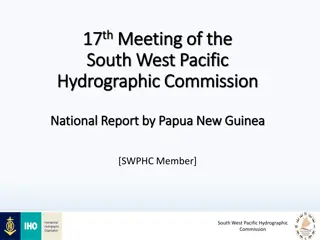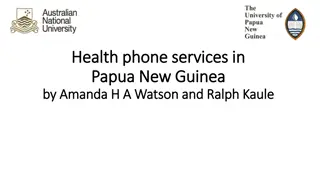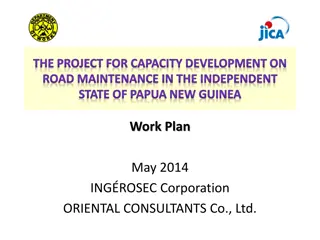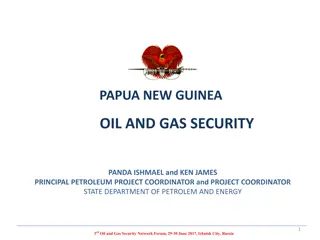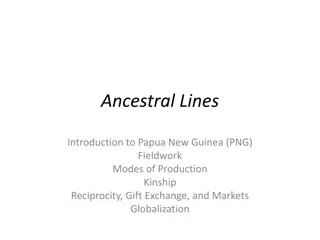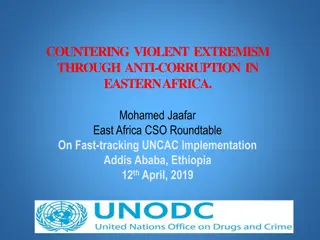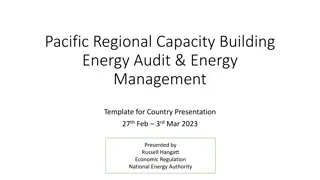Perceptions of Patron-Client Politics on Corruption in Papua New Guinea: A Research Proposal
Investigate the impact of patron-client politics on corruption in PNG to understand its effects on civil service and governance. Analyze traditional and modern systems to identify prevailing patronage types and their influence on corruption. The study aims to redefine corruption in the PNG context for more effective policy interventions.
Download Presentation

Please find below an Image/Link to download the presentation.
The content on the website is provided AS IS for your information and personal use only. It may not be sold, licensed, or shared on other websites without obtaining consent from the author.If you encounter any issues during the download, it is possible that the publisher has removed the file from their server.
You are allowed to download the files provided on this website for personal or commercial use, subject to the condition that they are used lawfully. All files are the property of their respective owners.
The content on the website is provided AS IS for your information and personal use only. It may not be sold, licensed, or shared on other websites without obtaining consent from the author.
E N D
Presentation Transcript
2018 PNG Update PNG in the year of APEC A RESEARCH PROPOSAL Citizens perceptions of patron-client politics on corruption and its impact on civil service and governance system in PNG Teddy Edwards Winn Political Science Strand University of Papua New Guinea UPNG Waigani Campus 14thJune 2018
Content 1. Introduction 1.1 Research background 2. Literature review 2.1 Patron-client relations theory/model 2.2 Patrimonialism 2.3 Contextualizing patronage politics in PNG 2.3.1 Wantok system 2.3.2 Big man system 2.3.3 Corruption: a norm 3. Research methodology 3.1 Research design 4. Data analysis and presentation 4.1 Limitations and options for future research 5. Conclusion 6. References
1. Introduction 1.1 Research background Preliminary research proposal. Intended for advanced postgraduate qualification. Research inspired by this observation: the co-option of traditional structures onto the modern administrative apparatus have overtime militated against the latter, hence leading to dismal government performance. Investigate and establish the correlation (positive/negative) between patron-client politics and corruption. One way to test this is through analyzing forces within the two systems below, and how they impact on governance. i. Traditional cultural system ii. Modern bureaucratic system The result of this investigation is intended to identify the type of patronage prevailing in PNG s state institutions. Johnson (2012) typology of patronage 1. Official mogul 2. Oligarch and clan 3. Elite cartel 4. Interest or influence market/Corporatist culture To further understand the specific context in which corruption occurs in PNG, three key views must be accounted for including: 1. Corruption perceived as sustained by culture and tradition (wantok system). 2. Corruption seen as sustained by the big man concept/elitist culture. 3. Corruption becomes a norm due to over-use or misuse of the two former issues. The qual-quan research method will be used.
Introduction. 1.2 Problem statement Understand corruption, and how it is manifested through the complex web of patron-client networks within the public service, governance, and political systems in PNG.
Introduction 1.3 Significance of this study This study attempts to redefine corruption in the PNG context. Distinguish corruption from the conventional definition . My contention: current definition fails to highlight the nexus between modern governance form and traditional form, and their boundaries. Argument: Formal moral and legal understanding distort people s views. Deconstructing the conventional definition of corruption, and reconstruct a new typology within the present PNG context. Findings may contribute towards policies currently aimed at addressing corruption, with the right and most appropriate approaches that are context specific to PNG s development needs and aspirations.
Introduction 1.4 Organization of the study A four part study as presented in the content.
2. Literature Review Studies on corruption abound. Patron-client studies traced its origins back to the feudal age. Both studies have overtime gained prominence in development literatures, especially in the developing global south. Key literatures: Ayius and May (2007) Corruption in Contemporary Papua New Guinea: Towards an Understanding of Issues. Brinkerhoff and Goldsmith (2002) Clientelism, Patrimonialism, and Democratic Governance Grindle (2012) Jobs for the Boys: Patronage and State in Comparative Perspective Gunay (2007) Clientelism in Modern Bureaucracies Horacio and Larreguy (2013) Monitoring Political Brokers: Evidence from Clientelistic Networks in Mexico. Johnston (2012) Corruption and Reform: One Size Does Not Fit All Kanekane (2007) Tolerance and Corruption in Contemporary Papua New Guinea Kaufman (1974) The Patron-Client Concepts and Macro-Politics: Prospects and Problems Kettering (1988) The Historical Development of Political Clientelism Kitschelt (2000) Linkages Between Citizens and Politicians in Democratic Polities Kurer (2007) Why do Papua New Guinea Voters Opt for Clientelism? Democracy and Governance in a Fragile State Lasswell (1936) Politics: Who Gets What, When and How. Nanau (2011) The Wantok System as a Socio-economic and Political Network in Melanesia Roniger (1994) The Comparative Study of Clientelism and Changing Nature of Civil Service in the Contemporary World Schmidt et al (1977) Friends, Followers, and Factions: A Reader in Political Clientelism. Scott (1972) Patron-client Politics and Political Change in Southeast Asia Singer (2009) Buying Votes with Dirty Money: The Relationship between Clientelism and Corruption
Literature Review 2.1 Patron-client model: multidyadic (asymmetrical) relationship. A highly reciprocal structure. P p(B)1 p(B)2 p(B)3 c c c c c c c c Source: Researcher s own Key P Official Patron (status/power/wealth/resources) p(B)1,2,3 etc. Broker/Middle man(status/power/loyalty) c Client (loyalty/obedience)
Literature Review 2.2 Patrimonialism Stems from one of Weber s three sources of authority, i.e. traditional authority. Patrimonialism describes situations where the administrative apparatus is appointed by and responsible to the leader (Weber, 1947). All governments, including those that stick closely to the patron-client model, need administrative structures and a workforce (Brinkerhoff and Goldsmith, 2002). Closely associated with clientelist politics.
Literature Review 2.3 An understanding of patron-client politics and corruption in PNG 2.3.1 Cultural and traditional perception of corruption (wantok system) 2.3.2 The big man and the elitist model. 2.3.3 Corruption: a norm/culture?
3. Research Methodology 3.1 Study area/perimeter Only one study site is selected. Port Moresby A microcosm of PNG society. PNG s political, administrative and economic center. Resource (funds) limit diversification of study perimeter/scope. Intended for advanced postgraduate qualification.
Research Methodology 3.2 Research design Research design denotes both a process and a product aimed at facilitating the construction of sound arguments. The purpose of research design is to define the structure of an inquiry into a research problem that will produce a persuasive, valid, and demonstrably useful argument in the eyes of the researcher's audience (Justice, 2008:75-76). The quality of the design will be a determinant of the quality of the product. For this research, I will employ both known methods (qual- quan approach). The mix method will hopefully make this study reliable and valid. 3.2.1 Qualitative (Desktop/Content Analysis) 3.2.2 Quantitative (Survey Method)
Research Methodology 3.2.2 Survey research Widely used in research. Probes individual s opinions, attitudes, behaviour, and preferences in a social setting and collect information on demographics and various other topics that are of interest to researchers (Majumdar, 2008:241). Survey is probably the best method available to the social researcher who is interested in collecting original data for describing a population too large to observe directly (Babbie, 2010:254). Three main survey types: Descriptive Explanatory Exploratory This study will employ both the descriptive and explanatory methods.
Research Methodology 3.3 Data collection technique Three targeted units of analysis i. Public sector employees. ii. Private sector employees/civil society. iii. Informal sector citizens/private citizens/tertiary and college students, etc. iv. MPs??? Specific data sets Perceptions Intentions The data Experiences Population sample/size I consider a good sample size to be between 150 and 200 (time/resource factor). This study will employ a random selection of150 samples (50 respondents per group). About 200 questionnaires will be delivered. The 50 generic sets will cater for any drawbacks. A survey checklist is being developed Delivery mode: Personal one-on-one interview. FGDs Online (survey monkey/email/social media group etc.).
Research Methodology Survey questionnaires are designed using: i. The unstructured format, the Goodman scale, which will allow me to rate the strengths and weaknesses of the patron-client systems. ii. The 5-point Likert scale will be used to rank the responses. I will perform a regression analysis to test the validity of my hypothesis once the data is processed and ready. Establish a cause-effect relations or correlation between patron-client politics and corruption.
Research Methodology The research questionnaire is divided into 4 main parts: A) Typology of corruption, B) Decision making in political and administrative systems, C) Prevailing mood of political and economic environments, & D) Bio-data/respondent s demographics (control variables). Key variables: Independent: Corruption (COR) Dependent: Clientelism (CLI) Governance (GOV) Patrimonialism (PAT) Civil Service Practice (CSP) Procurement Kickback (POK) Pork Barreling (POB) Rent Seeking Behaviour (RSB)
Research Methodology Regression Model COR= 0 + 1CLI + 2GOV + 3PAT + 4CSP + 5POK + 6POB + 7RSB + .(1) Where, CLI=Clientelism, GOV=Governance, PAT=Patrimonialism, CSP=Civil Service Practice, POK=Procurement Kickback, POB=Pork Barreling, RSB=Rent Seeking Behaviour 0, 1, 2, 3, 4, 5, 6, 7 and are regression parameters.
Research Methodology 3.4 Objectives, Research Questions and Hypotheses 3.4.1 Study objectives 1. Understand the occurrence of corruption, and how it is manifested through the complex web of patron-client networks within the civil service, governance and political systems in PNG. 2. Investigate the correlation between the dynamic forces of culture and tradition contesting against modern bureaucratic system in PNG. 3. Identify the type of patronage prevailing or pervading the political and governance systems in PNG. 4. Deconstruct the conventional definition of corruption and construct or redefine corruption based on the typology derived from above. 5. Findings would hope to influence policy and decision making, strengthen internal governance, and improve relations between PNG and its external partners.
Research Methodology 3.4.2 Research questions Is corruption a function of patron-client relations in a society that is culturally diverse and heterogeneously fragmented? Function: C=Pc+ch+cd, where C=corruption, Pc=Patron-client links, ch=cultural heterogeneity, cd=cultural diversity. Is corruption in PNG systemic, systematized, or a new culture ? Crocombe (2001) What specific type of patronage system exists? Official mogul, oligarch and clan, elite cartel, and interest or influence market (Johnston, 2012:3-8).
Research Methodology 3.4.3 Hypotheses There are two main hypotheses for this study: i. Corruption in in PNG s civil service, governance, and political system is mutually reinforced by patron-client politics. ii. The mutual interactions of patron-client politics and corruption is a result of a complex web of subtle and opaque patron- client networks or cliques.
Research Methodology 3.5 Data processing, analysis and testing of hypotheses, and presentation Collected data will be scrutinized, coded if necessary, and entered in the software program to get required data. Univariate, bivariate as well as multivariate analysis will be done to fulfill the objective, to answer the research questions, and to test the hypothesis. Quantitative data will be managed using either the SAS or SPSS for both descriptive and inferential statistics. Information collected from qualitative data or content analysis will be used to justify and validate the information collected from the quantitative method. Peer review from academic advisor(s) before findings can be accepted. The findings will be presented for official and public consumption.
Research Methodology 3.6 Limitations and options for future research 3.6.1 Limitations Fear of overlapping some else s study (prior) Research ethics information or data might be compromised due to sensitivity of the issue. Response rate this might be low ICT inadequacy Low awareness of complex question sets ( especially from informal sector respondents). 3.6.2 Future research There is need for more empirical research on corruption studies. Relying on the traditionally concocted moral and legal aspects of corruption will not avail development and governance much. One possible area of research is to do a comparative analysis of the same by comparing regional political systems (Fiji, SI, Vanuatu) (Caution: large comparative studies with n data may be quite ambiguous if research designs are not right).
Conclusion Preliminary research proposal intended solely for academic purposes. Core aim is to identify a clear causality between corruption and patron-client politics. PNG as case study. Literature on corruption and patron-client politics abound. The study will employ the qual-quan approach. There are limitations. More studies need to be done into this grey area to better inform public policy and decisions. Findings from this study will be presented for formal and public consumption, hopefully in a conference or seminar like this.
End! Thank you.
